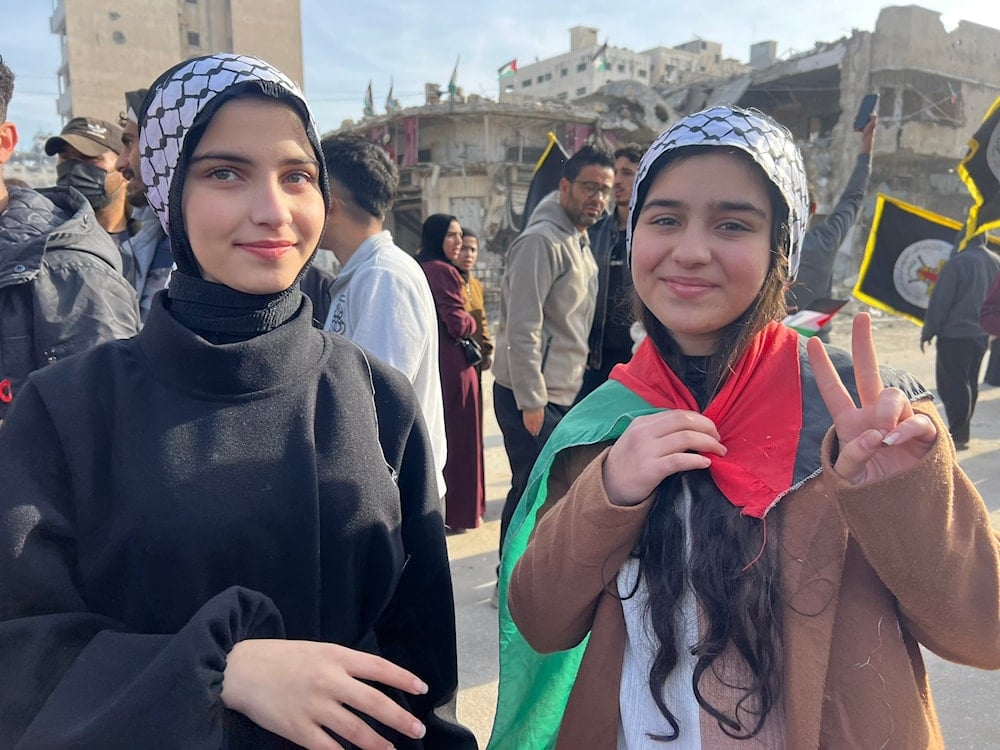Gaza's victory: Displaced return, Resistance reclaims streets
Despite 15 months of Israeli efforts to eliminate the Palestinian Resistance, the Al-Qassam Brigades emerged in celebration on military vehicles, greeted by loud cheers and chants of admiration from the people.
-

Palestinian children celebrate the end of the Israeli Genocide and the Palestinian resistance’s victory in Gaza on January 19, 2025. (@AbujomaaGaza / X)
After 470 days of relentless Israeli bombardment, Gaza emerged victorious, its people resilient in the face of brutality. As the ceasefire took effect, forcibly displaced residents rushed home, returning to their neighborhoods in the Gaza Strip.
Despite 15 months of Israeli efforts to eliminate the Resistance, Al-Qassam Brigades came out in celebration in military vehicles. Their arrival was met with loud cheers and chants of admiration from the people.
In a symbol of solidarity and loyalty, Gaza’s residents also showed strong support for Hamas' leader, Mohammad Deif, by chanting slogans in his favor during the rally.
كتائب #القسام تخرج بمركباتها العسكرية في جنوبي قطاع #غزة.#الميادين #غزة_تهزم_الإبادة pic.twitter.com/HB71VhTHYE
— قناة الميادين (@AlMayadeenNews) January 19, 2025
From Rafah to the northern reaches of Gaza, families rushed back to their homes, which had been reduced to rubble by Israeli airstrikes.
As soon as the Israeli military withdrew, residents began to return to the besieged areas. Amid the widespread devastation, Gazans captured images of the departing military vehicles—vehicles that had failed to breach northern towns such as Jabalia, Beit Lahia, and Beit Hanoun.
In these towns, Resistance fighters emerged from underground tunnels, fiercely defending their communities to the very last moment, embodying a spirit of resilience in the face of overwhelming odds.
"يا سرايا ويا قسام.. لا لا للاستسلام"
— قناة الميادين (@AlMayadeenNews) January 19, 2025
هتافات تتردد في #خان_يونس خلال الاحتفالات ببدء سريان وقف إطلاق النار.#الميادين#غزة_تهزم_الإبادة pic.twitter.com/KJvseEzbfx
In the central Gaza Strip, families returned to their homes in the Nuseirat refugee camp, while tens of thousands of forcibly displaced people also made their way back to the city of Rafah in the South.
The triumphant return of Gaza’s displaced was a powerful testament to their endurance, as they reclaimed their homes.
Israeli reactions to the ceasefire
On the Israeli side, there were no celebrations, no sense of victory, and no rallying around the government. Instead, there was widespread anger and opposition to the agreement, with many viewing it as a concession that reinforced Hamas’s status as the victor in the war.
Just hours after the ceasefire agreement in Gaza took effect, the far-right Otzma Yehudit party officially exited "Israel’s" coalition government, following through on its threat to withdraw if a ceasefire deal with Hamas was enacted.
Israeli Police Minister Itamar Ben-Gvir, Heritage Minister Amichai Eliyahu, and "Negev, Galilee, and National Resilience" Minister Yitzhak Wasserlauf all submitted their resignation letters to Prime Minister Benjamin Netanyahu. The party issued a statement confirming that effective immediately, Otzma Yehudit was no longer part of the coalition.
In his resignation letter to Netanyahu, Ben-Gvir acknowledged the "significant achievements" during the prime minister's leadership but criticized the ceasefire deal as a "surrender-to-terror" agreement that "crosses all ideological red lines." He argued that the ceasefire was "a complete victory for terrorism" and stated that the party would no longer support the government on ideological matters.
Former Israeli general: Hamas is the victor
After 470 days of relentless attacks on Gaza, aimed at eliminating Palestinian Resistance, Former IOF Major General Giora Eiland has admitted that the war ended in a “resounding failure for Israel” and declared Hamas the victor.
Speaking to Channel 7 on Saturday evening, Eiland stated that “Israel” had failed to achieve its declared objectives. “Hamas will recover from the severe blow it suffered, not all the hostages will return, and Israel will not eliminate Hamas’s authority,” he acknowledged, reinforcing earlier critiques of the war’s outcomes.
Protests in Tel Aviv over captive exchange deal
Ahead of the ceasefire’s implementation, Tel Aviv saw widespread protests by settlers opposing the prisoner exchange deal. Demonstrators clashed with police, who deployed skunk water to disperse the crowds.
According to Israeli media, protesters expressed outrage over the agreement, demanding its cancellation. They argued that the deal “will release hundreds of Palestinian detainees, erase the achievements of the war, and pave the way for another attack similar to October 7.”
Read next: Divisions in 'Israel' over Gaza war prompt election demands petition

 4 Min Read
4 Min Read








